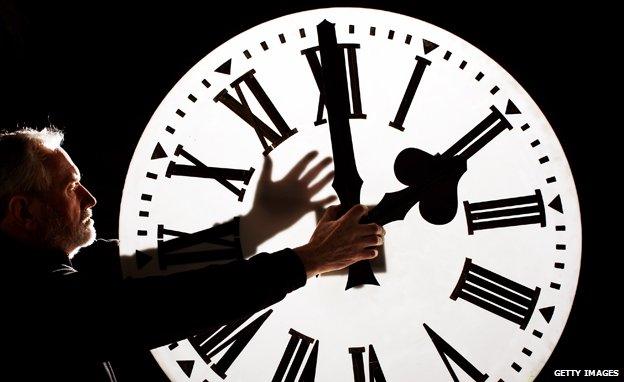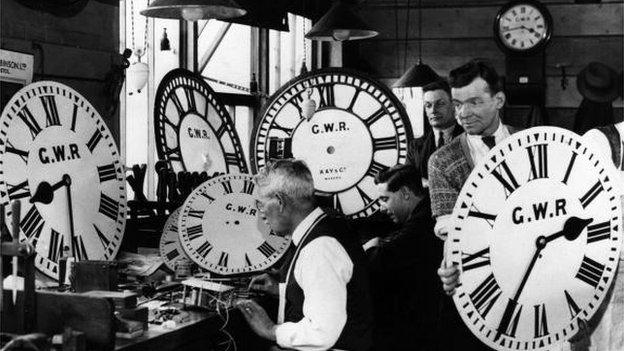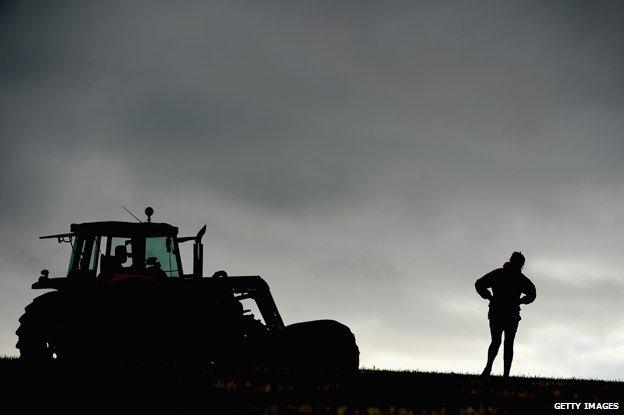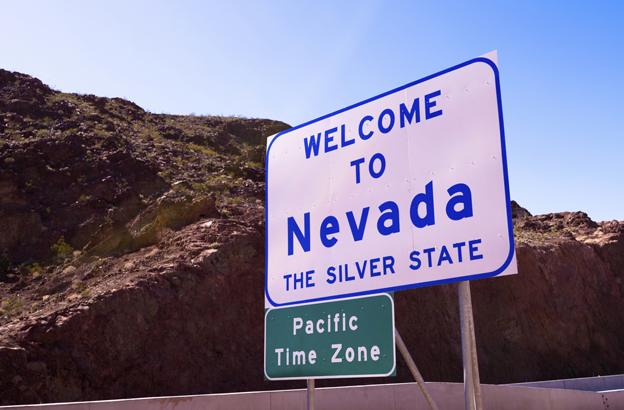Scottish independence: Could vote help shift the debate on clocks?
- Published

A major objection to repeated calls to bring the UK's clocks into line with Europe has been the darker mornings it would mean for northern Scotland. Would a "yes" vote for independence shift the debate?
The proposal that British Summer Time (BST) should be maintained during the winter months and "double summertime" applied during summer months is not a new one.
It would put the UK one hour ahead of GMT during winter and two hours ahead during summer, in line with Central European Time and bringing about lighter nights but darker mornings.
Converts to the cause have been lobbying for a change for over 40 years, and believe it would bring about a host of improvements to everyday life - reducing the number of road accidents, saving the NHS money, boosting tourism, facilitating trade and travel with Europe, and giving the City more overlap with Asian markets.
There was a trial of permanent GMT+1 (although not "double summertime") from 1968 to 1971. But it ended with the government pronouncing its advantages and disadvantages impossible to quantify.
One of the chief stumbling blocks for the alleged panacea is its unpopularity in Scotland, where it would mean the sun would not rise until much later - 10:00 in some northern parts of the country.

That's a concern for children travelling to school and for trades which currently rely on early starts such as the construction industry and farming.
So it might seem possible that if Scotland votes to become independent in September, a long-standing tension could be resolved and a Westminster government could move ahead with making a brighter day (in a literal sense at least).
But for many, the idea of introducing such a divide between Scotland and the rest of the UK is just too drastic to contemplate.
Dr Mayer Hillman, whose first report on the issue for the Policy Studies Institute was published 26 years ago, predicts a "Yes" vote would "almost certainly" put the wheels in motion for a change across the rest of the UK.
The reasoning is primarily political. He argues a Westminster government with no Scottish MPs would be newly empowered to enact the change as it would not "be looking over its shoulder" at Scottish voters.
Despite this, he does not see Scottish independence leading to two different time zones in the British isles.
"In the event of Scottish independence, the rest of the UK would see the justification and make the change. Then I suspect Scotland would throw in the towel and go along with it."
The Yes Scotland campaign calls it "a matter of common sense" that Scotland would retain its current hours under independence - and that if the rest of the UK shifted, a decision would be taken on the basis of "sensible discussion and agreement". A spokesperson for Better Together says: "This is a very important issue for many communities and grows in importance the further north you go. It is too important a decision to be caught up in the current constitutional debate about the referendum on independence."


Timely experiments
The first recorded occasion when local times in different parts of the UK were synchronised was in 1840, with the standardised time arrangement applied by the Great Western Railway
The clocks were moved forward by an hour during World War II, to maximise productivity at munitions factories and to ensure people got home safely before the blackout
In 1968 the UK embarked on an experiment whereby British Standard Time (GMT +1) was employed all year round - the clocks were put forward as usual in March 1968 and not put back until October 1971
The government's White Paper in 1970 concluded it was impossible to quantify the advantages and disadvantages of the move

Conservative MP Rebecca Harris introduced a bill in 2011 which would have required the government to carry out research on the practicalities of a move to Central European Time.
It ran out of parliamentary time in 2012. Opponents cited confusion over the potential impact on road deaths, as well as the effect on the north of Scotland.
Harris maintains that making the shift would have benefits for Scotland too and that the Scottish argument has been set up as "something of a straw man". She is keen to stress that "we could only have a change backed by the whole of the UK". She has no current plans to introduce another bill.
The SNP's Angus MacNeil is the MP for Na h-Eileanan an Iar and was one of the MPs who voted against the bill in 2012. He's also unwilling to draw a distinction between Scottish interests and those of the rest of the UK: "Not just in my constituency, but anybody living north of Manchester should have concerns - it would mean darker days for significant portions of the country."
Nevertheless, there are still undeniable differences between how the question is viewed on either side of the border.
Farmers have traditionally been thought of as solidly against the idea. For the National Farmers' Union in England and Wales this is no longer the case - it takes a neutral stance and recent surveys have shown members are slightly in favour of change.

Dairy farmers would face a darker start to their winter mornings without BST
But the same cannot be said of the NFU in Scotland, as spokesman Bob Carruth explains: "A majority of our members still have concerns and would like to maintain the status quo."
He says NFU Scotland supported the 2011 bill because it wanted more research into the issue and because of the variety of farmers it represents. "Dairy farmers in Stranraer will have different needs from crofters in Shetland and we need to make sure all their voices are heard equally."
Opinion at large may differ between Scotland and the rest of the UK. A YouGov poll, external in 2011 found 35% of Scots supported the clocks going forward one hour (thus GMT+1 in winter and GMT+2 in summer) and 52% were against, whereas across the UK it was 53% for and 31% against.
So why not give everyone what they want - the status quo for Scotland, but Central European Time for England, Wales and Northern Ireland?
Hillman doesn't see this as a viable option. "The same things that make it preferable for the UK to be in line with Europe make it preferable for England to be in line with Scotland - ease of trade, travel and communications."
Businesses that already operate across different time zones have established ways of operating and might argue that there would be a cost attached to adapting to a new time zone in the UK.
Andrew Bond of engineering firm ETL Systems - based in Hereford but serving the US and Dubai - explains: "When we agree contracts, we need to have trained staff in the main time zones, along with spares, to support our equipment - most of the time the customer pays for this service." He predicts that ending up with different time zones "may put Scotland at a disadvantage" as "they would need to work later to provide the same support and service that companies in the rest of UK provide, which would cost in terms of wages and overtime".
Yet in some parts of the world, existing in a different time zone from a close neighbour is not seen as a massive obstacle.
The US state of Idaho has two time zones, a situation which can be traced back to divisions between people in the north of the state identifying with Washington state (which is on Pacific Time) and those who wanted Idaho to be on Mountain Time like Colorado, Montana and Wyoming.
Zach Hauge, a spokesman for the Idaho Association of Commerce and Industry, insists the two zones are seen as completely normal and "none of our members has ever brought it up as an issue".

Different US states have different time zones
In Arizona, clocks stay the same all year round while other states observe daylight saving. Mike Sunnucks of the Phoenix Business Journal says it can lead to "the odd conference call confusion and occasional missed appointment" but that on the whole "businesses find it pretty manageable".
Although it now observes European summertime, Norway voted against joining it in the 1960s and came into line later than many other countries. In Denmark there still exists a campaign against daylight saving, called the "Landsforeningen mod Sommertid" (the National Association Against Summertime). Finland remains outside Central European Time, two hours ahead of the UK.
For some, it might be reassuring that the controversy over time is not just a UK issue.


A referendum on whether Scotland should become independent is to take place
People resident in Scotland will be able to take part in the vote, answering the "yes/no" question: "Should Scotland be an independent country?"
The referendum will take place on Thursday, 18 September 2014
Go to the BBC's Scotland Decides page for analysis, background and explainers on the independence debate.

Subscribe to the BBC News Magazine's email newsletter to get articles sent to your inbox.